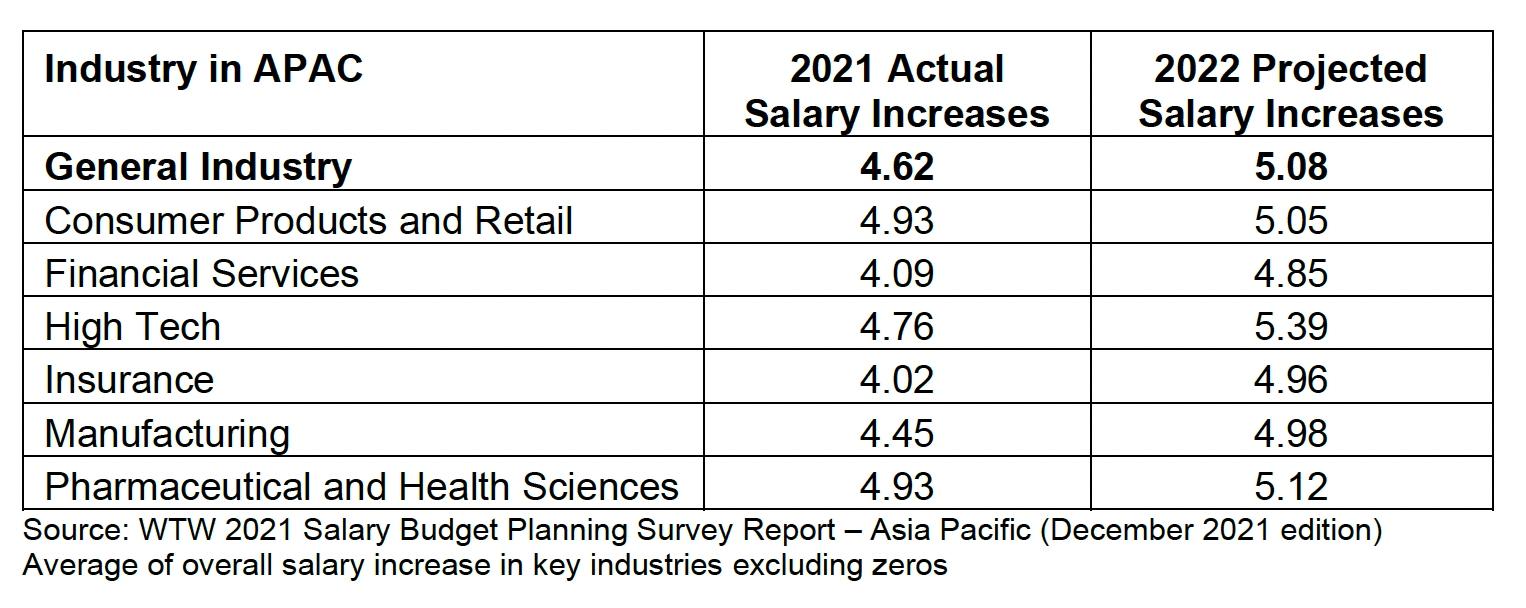share on
Employees in Singapore and Hong Kong should expect a salary increase of 3.8% in 2022, while those in Malaysia 4.7%, and in Thailand 4.8%.
Employers in Asia Pacific (APAC) are budgeting for an overall average salary increase of 5.08% for executives, management & professional employees, and support staff this year, according to Willis Towers Watson's latest Salary Budget Planning Survey report.
This is after recording an actual average pay increase of 4.62% in 2021.
The report revealed that two in five employers (42%) are planning for higher salary budgets this year. In fact, a quarter of the respondents (25%) have changed, and increased their expected salary increase budgets for 2022 from the original projections made in July last year.
In terms of market breakdown, the 2022 projected salary increase is as follows:
- Singapore - 3.8%, from 3.4% (2021)
- Malaysia - 4.7%, from 4.1% (2021)
- Hong Kong - 3.8%, from 3.3% (2021)
- Thailand - 4.8%, from 4.2% (2021)
- Indonesia - 6.6%, from 5.8% (2021)
- India - 9.2%, from 8.2% (2021)
- Vietnam - 7.8%, from 7.2% (2021)
As for employees in China, they can expect a salary increase of 6% - a 0.4% difference compared to 2021. While, those in Japan can expect 2.6%, and those in the Philippines 5.4%.
[refer to the graph on top for the full table on projections and actuals]
[ICYMI: Singapore salary insights 2022 for 5 sectors: ICT, banking & finance, manufacturing, and more]
Why the salary increase?
Based on the report, one-third (30%) of employers cited the "tight labour market" for increasing their salary budgets from prior projections. Meanwhile more than one in five employers (23%) felt that salary increase is possible because they "anticipated stronger financial results", and close to one in five (19%) attributed the increase to their concerns towards their employees pertaining to cost management, such as inflation, and rising cost of supplies.
"There seems little doubt that costs, wages, and prices are going up this year. Our study shows that employers are influenced by different factors in adjusting their salary budget projections this year. However, with APAC’s consumer price index (CPI) expected to hit 3% or even more in some markets, employers will most likely take living costs into account for salary increases," Edward Hsu, Business Leader, Rewards Data and Software, Asia Pacific, WTW, summed up.
Beyond that, the projected salary increase is due to a shortage of manpower in some sectors which is driving up the demand for skilled workers.
This trend is "igniting a war for talent" as employers compete to attract and retain employees who have more choices (in their career prospects) today than in recent years. The total attrition rates in several markets such as Australia, Hong Kong, Singapore, South Korea and Thailand have in fact "increased significantly", with most now exceeding pre-pandemic levels.
What is the projected salary increase by sector?
Regarding sectoral breakdown, the highest 2022 projected salary increase is for high-tech at 5.39%. This is followed by pharmaceutical & health services at 5.12%, and consumer products & retail at 5.05%. The full breakdown is shown below.

“The labour market anticipates new joiners not only from the unemployed, but also from the currently employed talent pool, prompting employers to closely look into their retention strategies," Hsu explained.
"Whether an organisation is experiencing the Great Resignation or the Great Hire phenomena, having relevant and competitive pay and benefit packages remains critical to attracting and retaining talent. There is a great reprioritisation of work, rewards and careers underway, and it’s putting significant pressure on compensation programmes for many employers."
Hsu, however, warned that salary increase for employees is not the be-all and end-all. To "win the talent war", employers should look at their total rewards strategy with a creative and comprehensive lens, and design a forward-looking rewards programme that is built for "future success" to support the business.
[ALSO READ: The workforce in 2022: 15 trends that will shape hiring, learning, working, and more]
Image / WTW
Follow us on Telegram and on Instagram @humanresourcesonline for all the latest HR and manpower news from around the region!
share on


